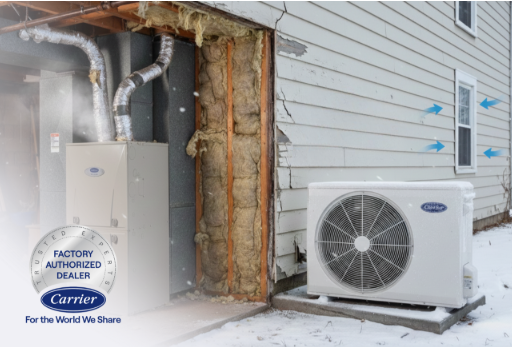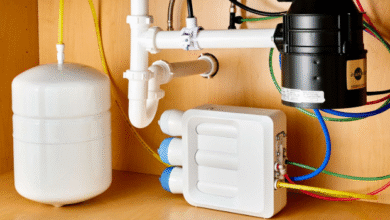How Poor Insulation Forces Furnaces and Heat Pumps to Overwork

A furnace or heat pump running constantly doesn’t always mean it will fail. Often, poor insulation is the hidden reason your system is overworking, reducing efficiency, and straining the equipment.
When insulation is insufficient, heat escapes in winter and enters in summer, forcing your HVAC system to work harder. This extra workload decreases overall efficiency and puts additional strain on the furnace or heat pump.
In this article, we’ll explore how poor insulation forces furnaces and heat pumps to overwork, why it impacts their efficiency, and what homeowners can do to improve system performance.
Key Reasons for Poor Insulation in a Home
Here are the Primary reasons for poor insulation in a home that forces furnaces and furnaces to overwork:
Improper Installation or Wrong Material
When insulation is installed incorrectly or the wrong material is used near HVAC areas, heat transfer becomes harder to control. This makes furnaces and heat pumps run longer just to maintain basic comfort.
With proper installation, your HVAC system doesn’t need to compensate for temperature loss. This keeps the runtime lower and helps the equipment work more efficiently.
See also: Enhancing Home Privacy with Window Film Solutions
Air Leaks Around Ducts and Vents
Gaps around ducts or vents allow conditioned air to escape before it reaches your rooms. This forces the system to cycle more often, increasing energy use and wear.
Sealing these leaks helps air reach the intended areas without extra effort. As airflow improves, the furnace or heat pump operates more steadily and efficiently.
Moisture Damage Near HVAC Areas
Damp or sagging insulation around mechanical spaces loses its ability to control heat flow. When this happens, HVAC systems must work harder to overcome the lost insulation value.
Replacing damaged insulation restores proper temperature control. This reduces unnecessary strain and helps the system maintain comfort with less runtime.
Aging or Compressed Insulation
Older or compressed insulation loses its thermal resistance over time, especially around attics and ductwork. This leads to faster heat loss or gain and forces the HVAC system to work overtime.
Refreshing or upgrading insulation helps stabilize indoor temperatures. With fewer extreme changes, the furnace or heat pump doesn’t need to run as frequently.
Poor Ventilation Impacting Airflow
Blocked or restricted airflow can weaken insulation performance by creating pressure imbalances. This makes your HVAC equipment work harder to circulate warm or cool air.
Improving ventilation supports smoother airflow throughout the home. As air moves more freely, the system can maintain comfort without overworking.
How Poor Insulation Leads to Overworked Furnaces and Heat Pumps
Below are the key performance issues one can observe in furnaces and heat pumps during poor insulation:
Uncontrolled Heat Transfer
Poor insulation allows warm air to escape in winter and hot air to enter in summer, making your furnace or heat pump work harder to maintain comfortable indoor temperatures. This constant effort reduces system efficiency and can make even high-performance HVAC equipment feel overburdened.
Heat leaks through walls, attics, floors, and poorly sealed windows or doors can create consistent temperature fluctuations. Over time, the system must compensate repeatedly for these losses, increasing operational stress and decreasing overall performance.
Overworked HVAC Cycles
Inadequate insulation causes furnaces and heat pumps to cycle on and off more frequently. These frequent starts and stops, combined with longer run times, place significant strain on components such as compressors, fan motors, and heat exchangers.
Extended cycling also prevents the system from maintaining a stable indoor temperature. As the HVAC system struggles to balance comfort across the home, it runs inefficiently, using more energy while wearing out faster.
Reduced Energy Efficiency
A poorly insulated home forces your heating or cooling system to consume more energy to reach the desired temperature. Even a high-efficiency furnace or heat pump will operate below its potential, wasting energy in the process.
This excessive energy use directly impacts utility bills and undermines the system’s efficiency. Without proper insulation, the HVAC system cannot operate at optimal performance, leading to higher operational costs over time.
Accelerated Equipment Wear
When furnaces and heat pumps run longer and cycle more frequently, internal components experience increased wear and tear. This can shorten the lifespan of the system and increase the frequency of repairs or part replacements.
Consistent overworking also makes the system more prone to unexpected breakdowns, especially during peak heating or cooling periods. Over time, poor insulation compromises overall system reliability and performance.
Uneven Temperature Distribution
Insufficient insulation can create hot or cold spots in different areas of the home, leaving some rooms uncomfortable while others reach the target temperature. This uneven distribution forces the HVAC system to work harder in problem areas.
The system may run longer or cycle more frequently to compensate for these inconsistencies, reducing efficiency and increasing strain on the furnace or heat pump. Proper insulation is essential to maintain uniform comfort and prevent overworking the system.
Get Expert Help to Address Insulation Problems
Proper insulation is essential to ensure that your furnace or heat pump runs efficiently. However, identifying insulation issues and implementing the right solutions can be challenging without professional guidance. HVAC experts have the knowledge and tools to assess your home’s insulation levels, identify problem areas, and recommend improvements that directly enhance system performance.
With more than 15 years of experience, Infiniti Home Comfort offers trusted professional ductwork services, helping residential & commercial properties fix airflow losses that contribute to overworked HVAC systems. Their expertise ensures your ducts are properly sealed and insulated, allowing your furnace or heat pump to operate efficiently and deliver steady, reliable comfort.
Wrapping up
Poor insulation forces furnaces and heat pumps to work harder, run longer, and cycle more frequently, reducing efficiency and placing extra strain on system components. This overworking can lead to uneven temperatures, higher energy use, and faster wear on the equipment.
Ensuring proper insulation allows these systems to maintain consistent indoor comfort while operating efficiently. With professional HVAC maintenance and the right insulation solutions, homeowners can prevent overwork, extend the lifespan of their furnace or heat pump, and keep their heating and cooling systems performing optimally.




